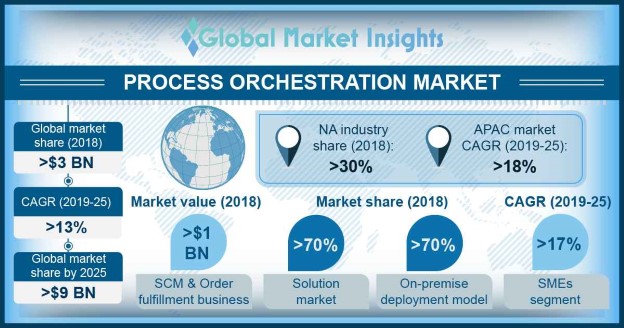Home > Media & Technology > Information Technology > IT Software > Process Orchestration Market
Process Orchestration Market Size
- Report ID: GMI3143
- Published Date: Feb 2019
- Report Format: PDF
Process Orchestration Market Size
Process Orchestration Market size was estimated at over USD 3 billion in 2018 and will grow at a CAGR of 13% between 2019 and 2025.
The rising trend of globalization and growth in the adoption of advanced technologies resulted into the rapid evolution of process orchestration solutions. Increasing demand from businesses for reducing production costs, enhancing value chain management, improving internal functioning, gaining competitive skills, and delivering higher customers’ satisfaction has significantly contributed to the process orchestration market growth.
Companies are adopting process orchestration solutions to streamline their business processes, creating new value, agility, and enhancing their competitive positioning. These companies are investing in developing innovative solutions for transforming their businesses delivering a unique customer experience. Around 55% of the start-ups in 2018 have already adopted a digital business strategy, which is projected to grow over the forecast period. The major sectors adopting the process orchestration solutions include manufacturing, retail, energy & utilities, healthcare, IT & telecom, and BFSI.
| Report Attribute | Details |
|---|---|
| Base Year: | 2018 |
| Process Orchestration Market Size in 2018: | 3 Billion (USD) |
| Forecast Period: | 2019 to 2025 |
| Forecast Period 2019 to 2025 CAGR: | 13% |
| 2025 Value Projection: | 9 Billion (USD) |
| Historical Data for: | 2014 to 2018 |
| No. of Pages: | 290 |
| Tables, Charts & Figures: | 456 |
| Segments covered: | Component, Business Function, Deployment Model, Organization Size, Application and Region |
| Growth Drivers: |
|
| Pitfalls & Challenges: |
|
The growing adoption of process orchestration solutions among SMEs is also projected to drive market growth. The small & medium-sized enterprises are committed toward creating a work culture that embraces technology to support employee productivity, accelerate growth, and optimize operations, driving the market demand. The government worldwide are also assisting the SMEs by offering grants and subsidies to go digital. For instance, in 2017, the Singapore government invested USD 80 million in small enterprises to embrace advanced technologies and unlock enhanced business productivity and growth.

